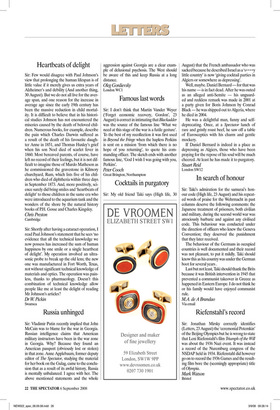Heartbeats of delight
Sir: Few would disagree with Paul Johnson’s view that prolonging the human lifespan is of little value if it merely gives us extra years of Alzheimer’s and debility (And another thing, 30 August). But we do not all live for the average span, and one reason for the increase in average age since the early 19th century has been the massive reduction in child mortality. It is difficult to believe that in his historical studies Johnson has not encountered the miseries caused by the death of beloved children. Numerous books, for example, describe the pain which Charles Darwin suffered as a result of the death of his favourite daughter Anne in 1851, and Thomas Huxley’s grief when his son Noel died of scarlet fever in 1860. Most bereaved parents, of course, have left no record of their feelings, but it is not difficult to imagine those of Murdo Matheson as he commissioned the gravestone in Kilmory churchyard, Rum, which lists five of his children who died of diphtheria within three days in September 1873. And, more positively, science surely did bring smiles and ‘heartbeats of delight’ to those children in the same era who were introduced to the aquarium tank and the wonders of the shore by the natural history books of P.H. Gosse and Charles Kingsley. Chris Preston
Cambridge
Sir: Shortly after having a cataract operation, I read Paul Johnson’s statement that he sees ‘no evidence that all the technical knowledge we now possess has increased the sum of human happiness by one smile or a single heartbeat of delight’. My operation involved an ultrasonic probe to break up the old lens; the new one was manufactured in Fort Worth, Texas, not without significant technical knowledge of materials and optics. The operation was painless, thanks to pharmacology. Doesn’t this combination of technical knowledge allow people like me at least the delight of reading Mr Johnson’s articles?
Dr W. Pickin
Swansea


































































 Previous page
Previous page